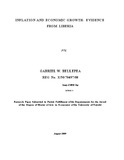| dc.description.abstract | This study set out to estimate the optimal level of inflation which is conducive for economic
growth in Liberia and to determine and establish the direction of causality between economic
growth and inflation. Using time series data for Liberia for the period 1960-2007, the study
employs an optimization model to analyze the threshold level of inflation for Liberia. The study
also utilizes the Johanson cointegration technique to determine the existence of a long-run
cointegration between growth rate of gross domestic product, foreign direct investment,
investment rate, inflation rate, exports and exchange rate.
The Granger-Causality test identifies a feedback or bilateral causality between inflation and
economic growth and the results from the optimization model recommend a 19% optimal level
of inflation, which is conducive for economic growth. The implication is that any inflation rate
above this optimal level would affect economic growth negatively in the Liberian economy.
The long-run and short-run results indicate that growth rate of gross domestic product is
positively affected by foreign direct investment, inflation rate, exports, exchange rate, investment
rate and the dummy variable. On the other hand, the dummy variable for war is found to
negatively influence growth rate of gross domestic product in Liberia. Moreover, a stability test
suggests that the estimated parameters do not suffer from structural instability.
Given the ambiguous relationship between inflation and economic growth and the primary
objective of the Liberian government as envisaged in its Poverty Reduction Strategy, the findings
of the study provides policy makers, especially the monetary authority, in Liberia with the
necessary information to formulate monetary policies that would target the reported- optimal
level of inflation in the Liberian economy thereby stimulating economic growth. Besides, the
findings suggest a bilateral causality between economic growth and inflation. Policy makers can
rely on this finding to institute policies that would enhance price stability thereby attractive
economic growth. | en_US |

